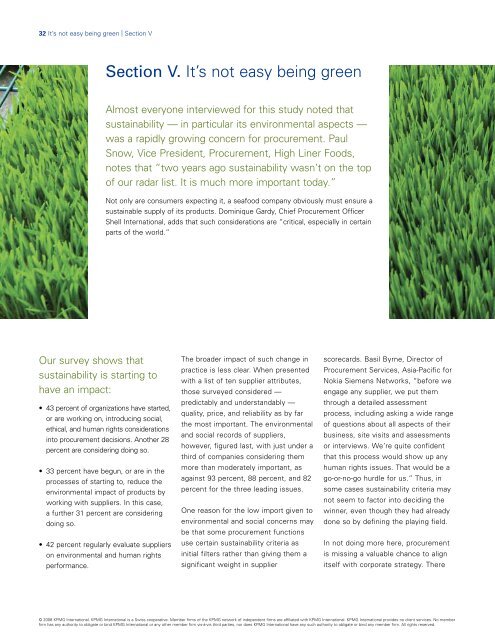Beyond purchasing
You also want an ePaper? Increase the reach of your titles
YUMPU automatically turns print PDFs into web optimized ePapers that Google loves.
32 It’s not easy being green | Section V<br />
Section V. It’s not easy being green<br />
Almost everyone interviewed for this study noted that<br />
sustainability — in particular its environmental aspects —<br />
was a rapidly growing concern for procurement. Paul<br />
Snow, Vice President, Procurement, High Liner Foods,<br />
notes that “two years ago sustainability wasn’t on the top<br />
of our radar list. It is much more important today.”<br />
Not only are consumers expecting it, a seafood company obviously must ensure a<br />
sustainable supply of its products. Dominique Gardy, Chief Procurement Officer<br />
Shell International, adds that such considerations are “critical, especially in certain<br />
parts of the world.”<br />
Our survey shows that<br />
sustainability is starting to<br />
have an impact:<br />
• 43 percent of organizations have started,<br />
or are working on, introducing social,<br />
ethical, and human rights considerations<br />
into procurement decisions. Another 28<br />
percent are considering doing so.<br />
• 33 percent have begun, or are in the<br />
processes of starting to, reduce the<br />
environmental impact of products by<br />
working with suppliers. In this case,<br />
a further 31 percent are considering<br />
doing so.<br />
• 42 percent regularly evaluate suppliers<br />
on environmental and human rights<br />
performance.<br />
The broader impact of such change in<br />
practice is less clear. When presented<br />
with a list of ten supplier attributes,<br />
those surveyed considered —<br />
predictably and understandably —<br />
quality, price, and reliability as by far<br />
the most important. The environmental<br />
and social records of suppliers,<br />
however, figured last, with just under a<br />
third of companies considering them<br />
more than moderately important, as<br />
against 93 percent, 88 percent, and 82<br />
percent for the three leading issues.<br />
One reason for the low import given to<br />
environmental and social concerns may<br />
be that some procurement functions<br />
use certain sustainability criteria as<br />
initial filters rather than giving them a<br />
significant weight in supplier<br />
scorecards. Basil Byrne, Director of<br />
Procurement Services, AsiaPacific for<br />
Nokia Siemens Networks, “before we<br />
engage any supplier, we put them<br />
through a detailed assessment<br />
process, including asking a wide range<br />
of questions about all aspects of their<br />
business, site visits and assessments<br />
or interviews. We’re quite confident<br />
that this process would show up any<br />
human rights issues. That would be a<br />
goornogo hurdle for us.” Thus, in<br />
some cases sustainability criteria may<br />
not seem to factor into deciding the<br />
winner, even though they had already<br />
done so by defining the playing field.<br />
In not doing more here, procurement<br />
is missing a valuable chance to align<br />
itself with corporate strategy. There<br />
© 2008 KPMG International. KPMG International is a Swiss cooperative. Member firms of the KPMG network of independent firms are affiliated with KPMG International. KPMG International provides no client services. No member<br />
firm has any authority to obligate or bind KPMG International or any other member firm visàvis third parties, nor does KPMG International have any such authority to obligate or bind any member firm. All rights reserved.



